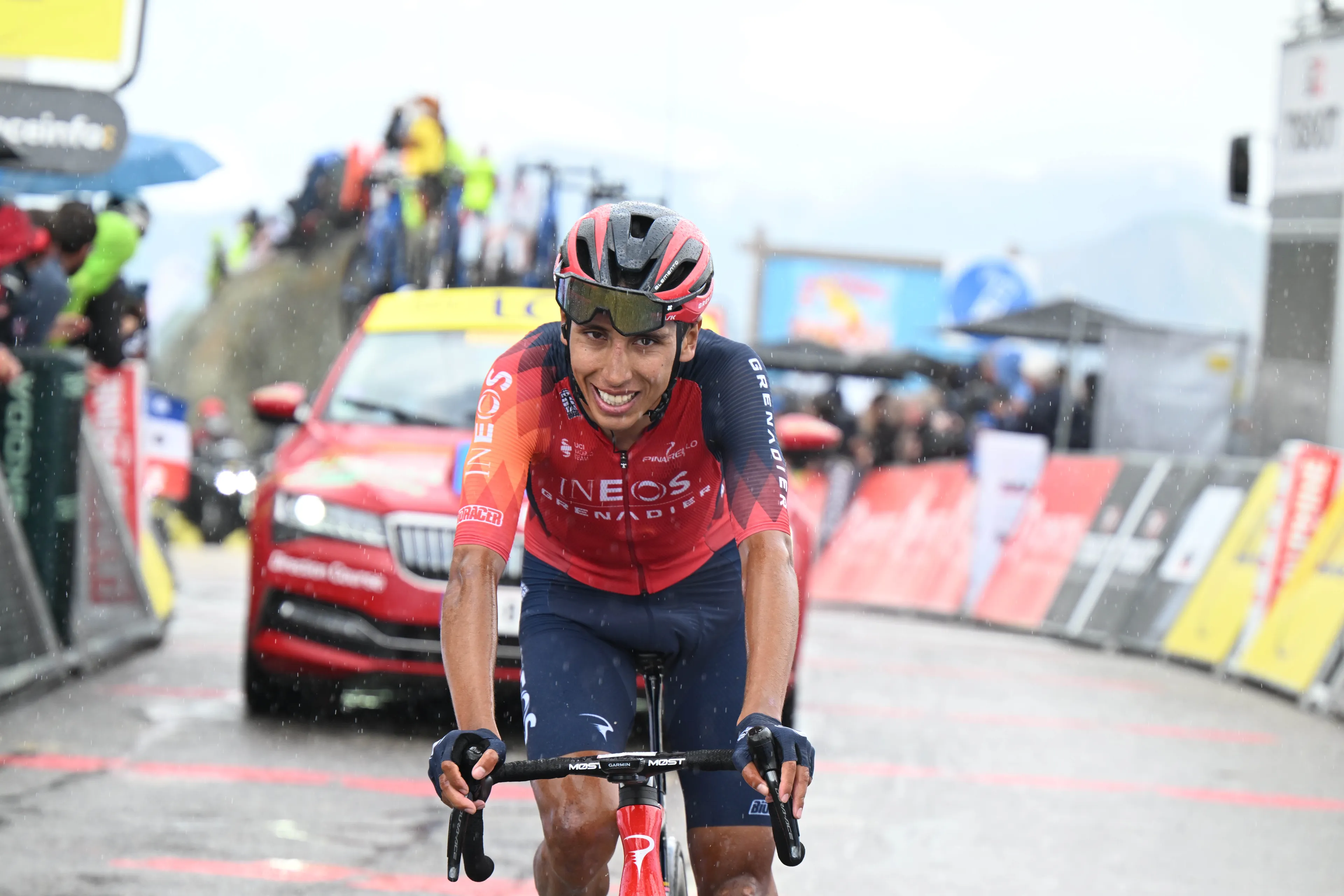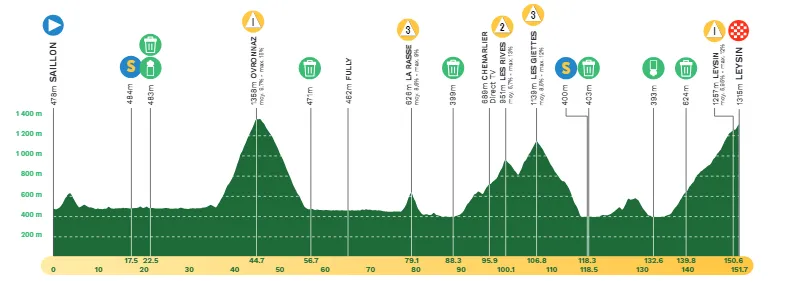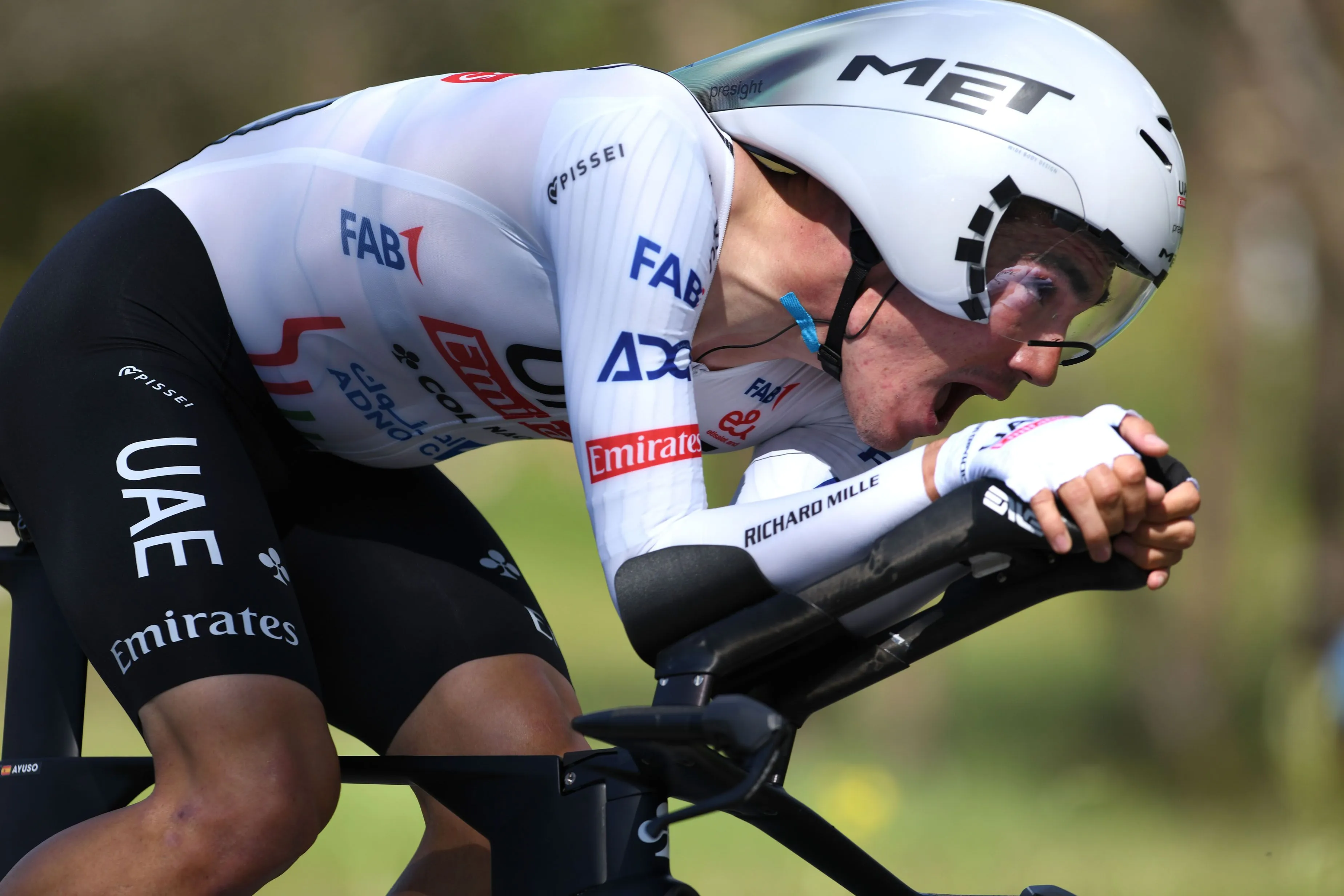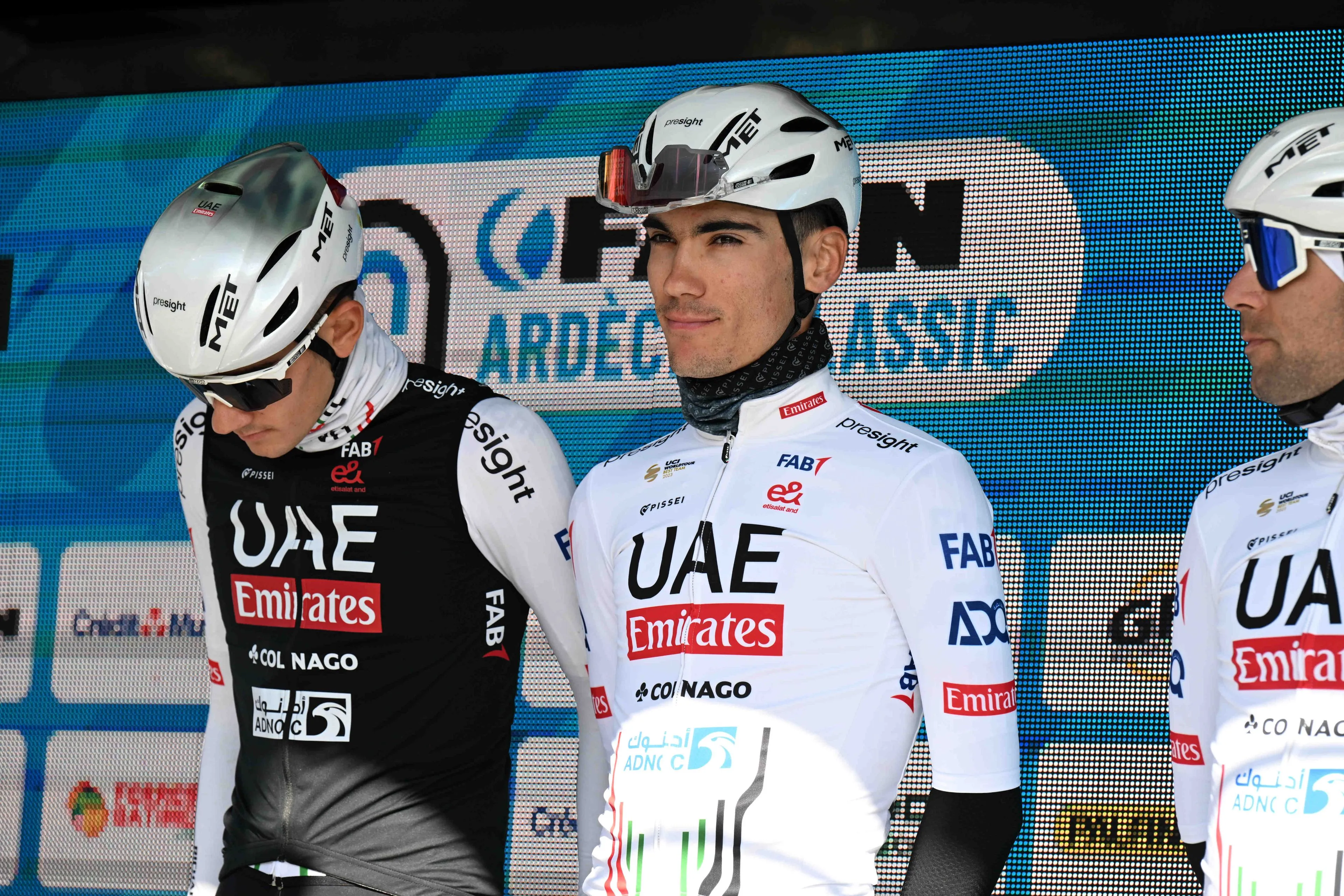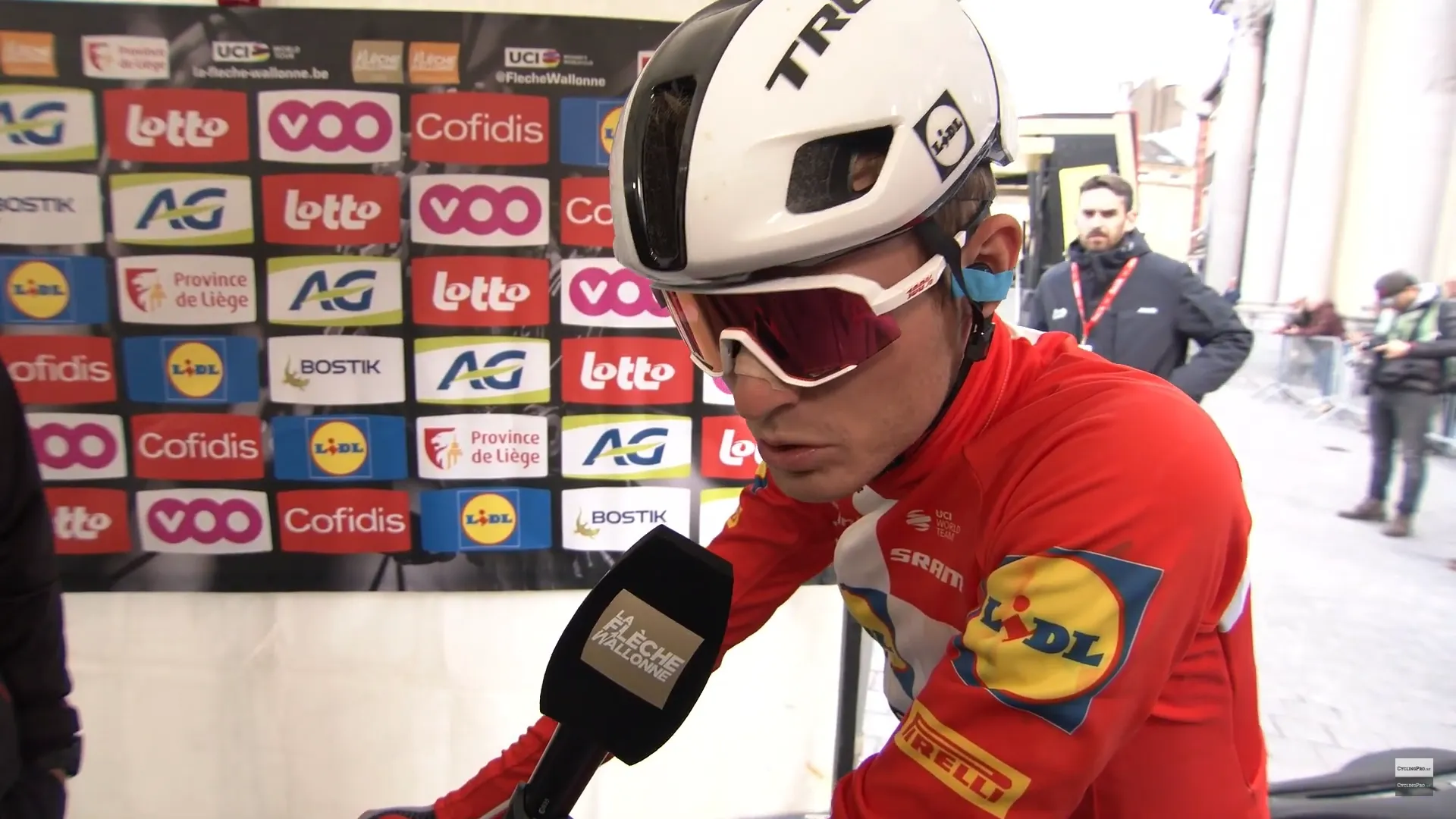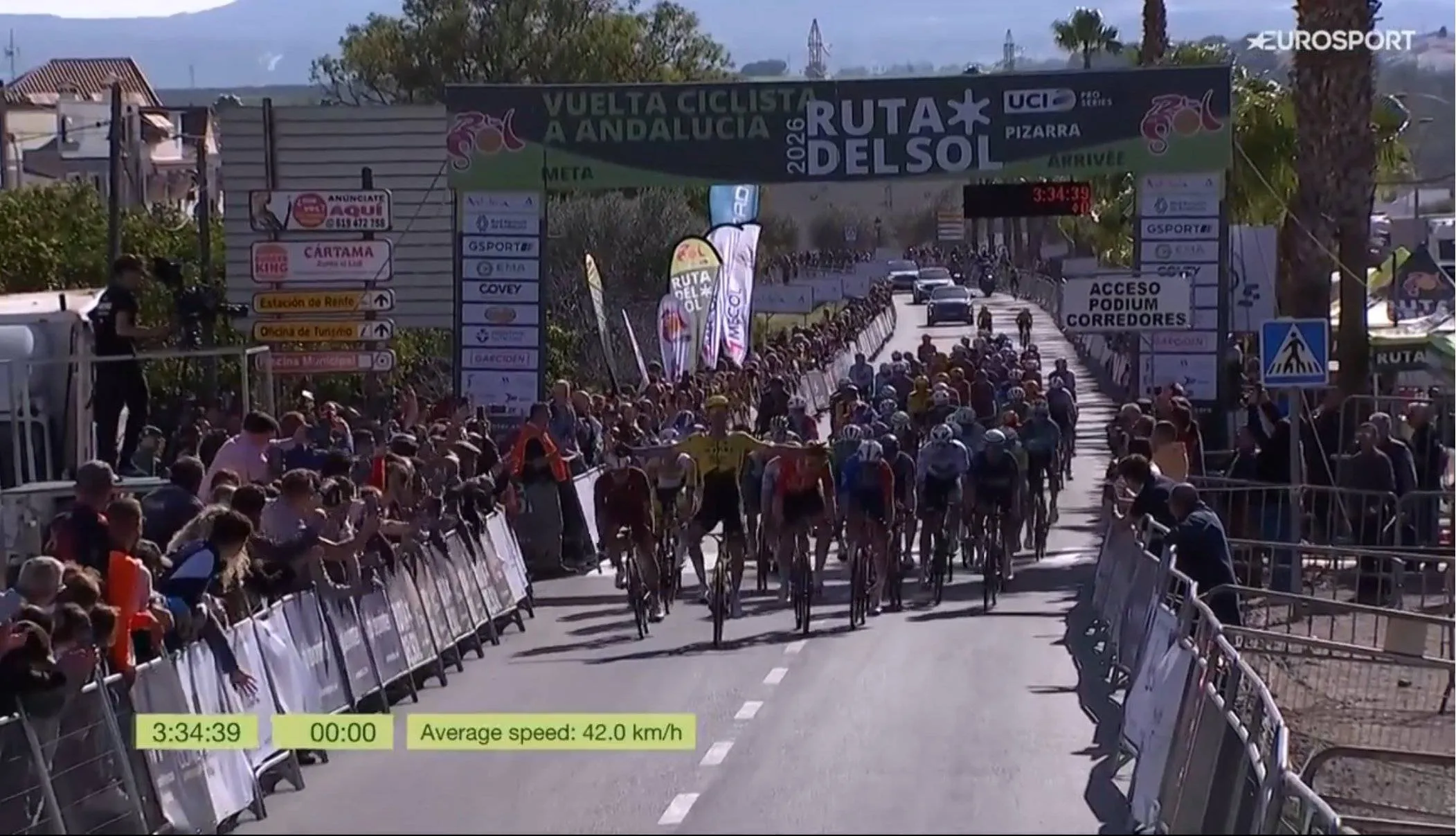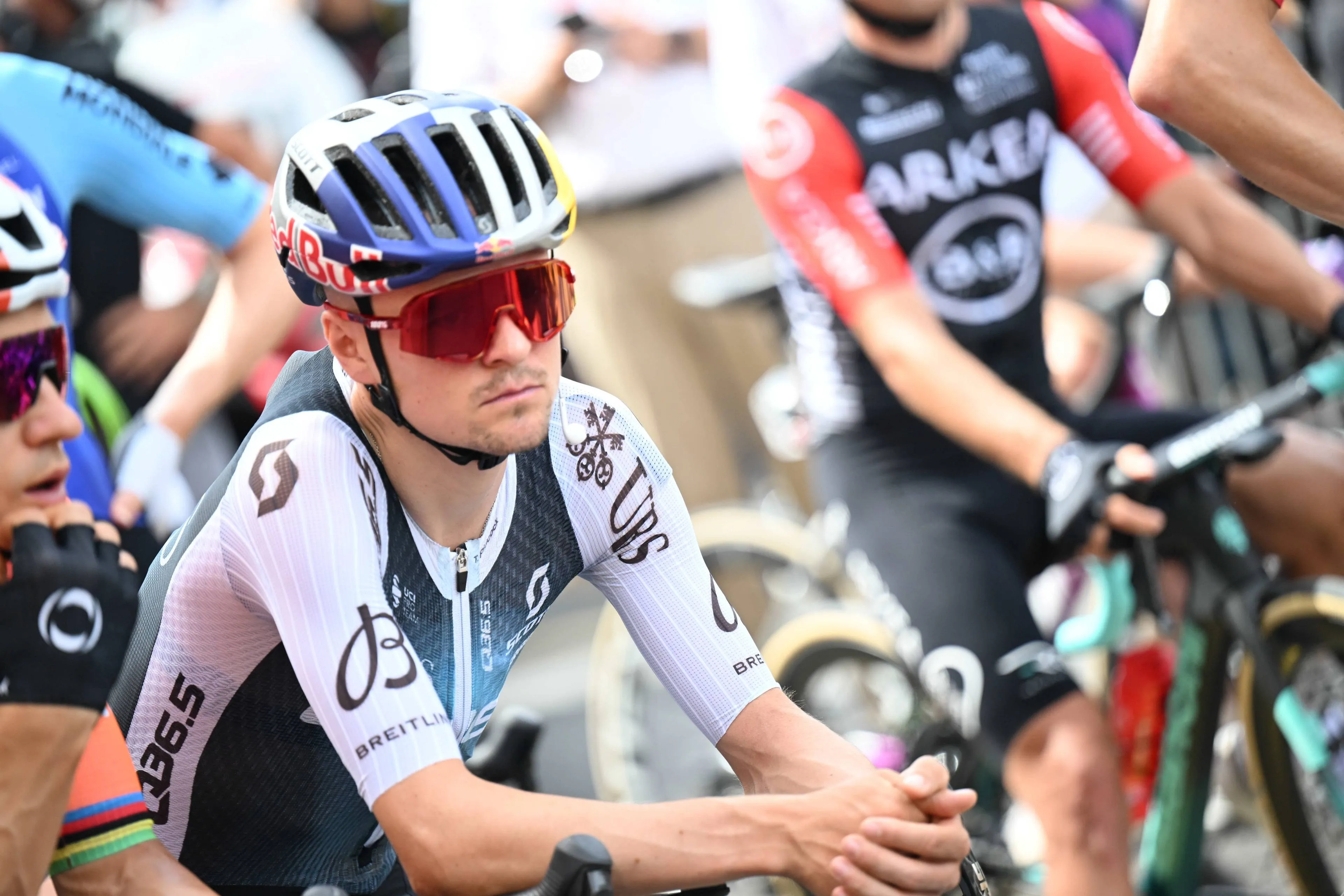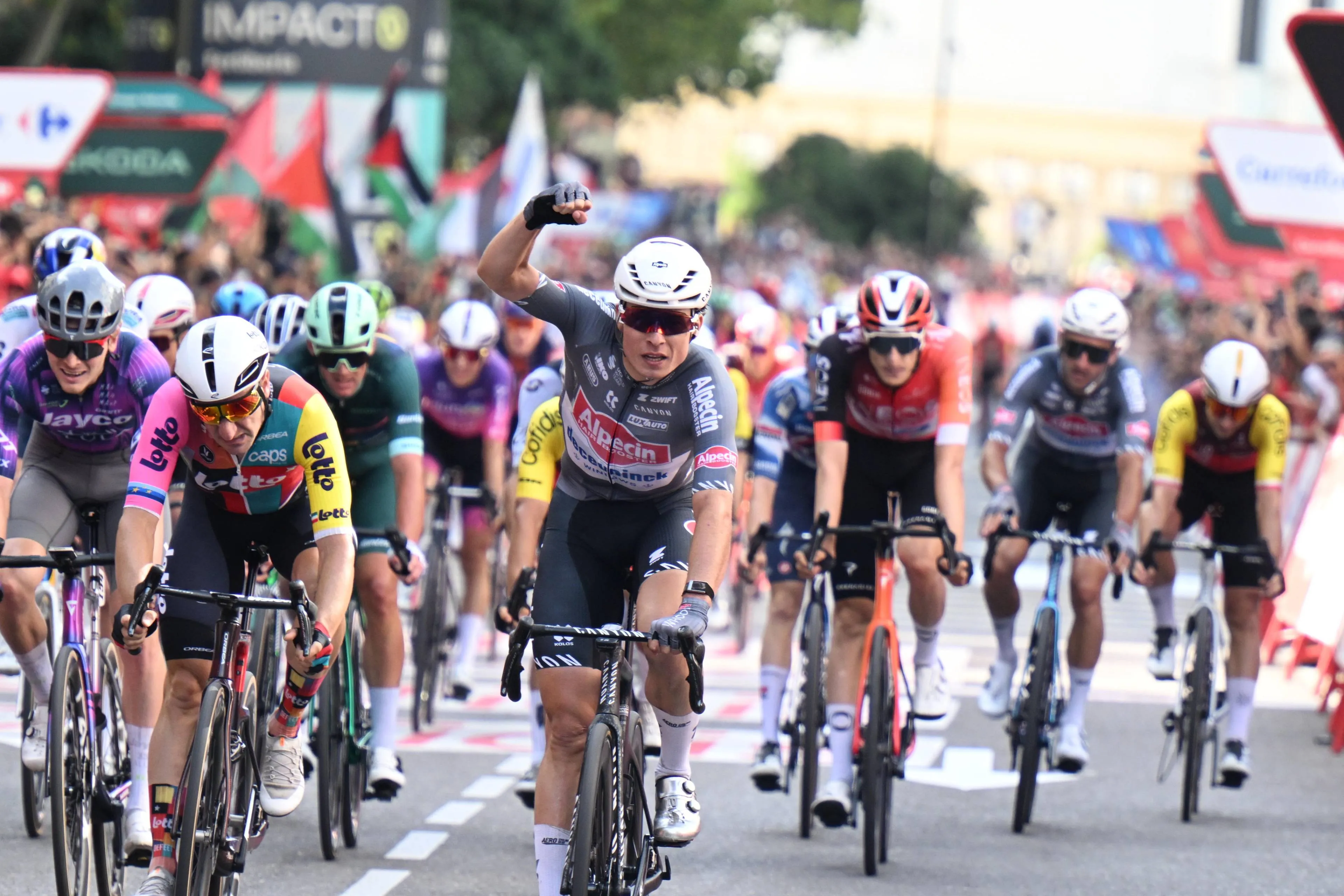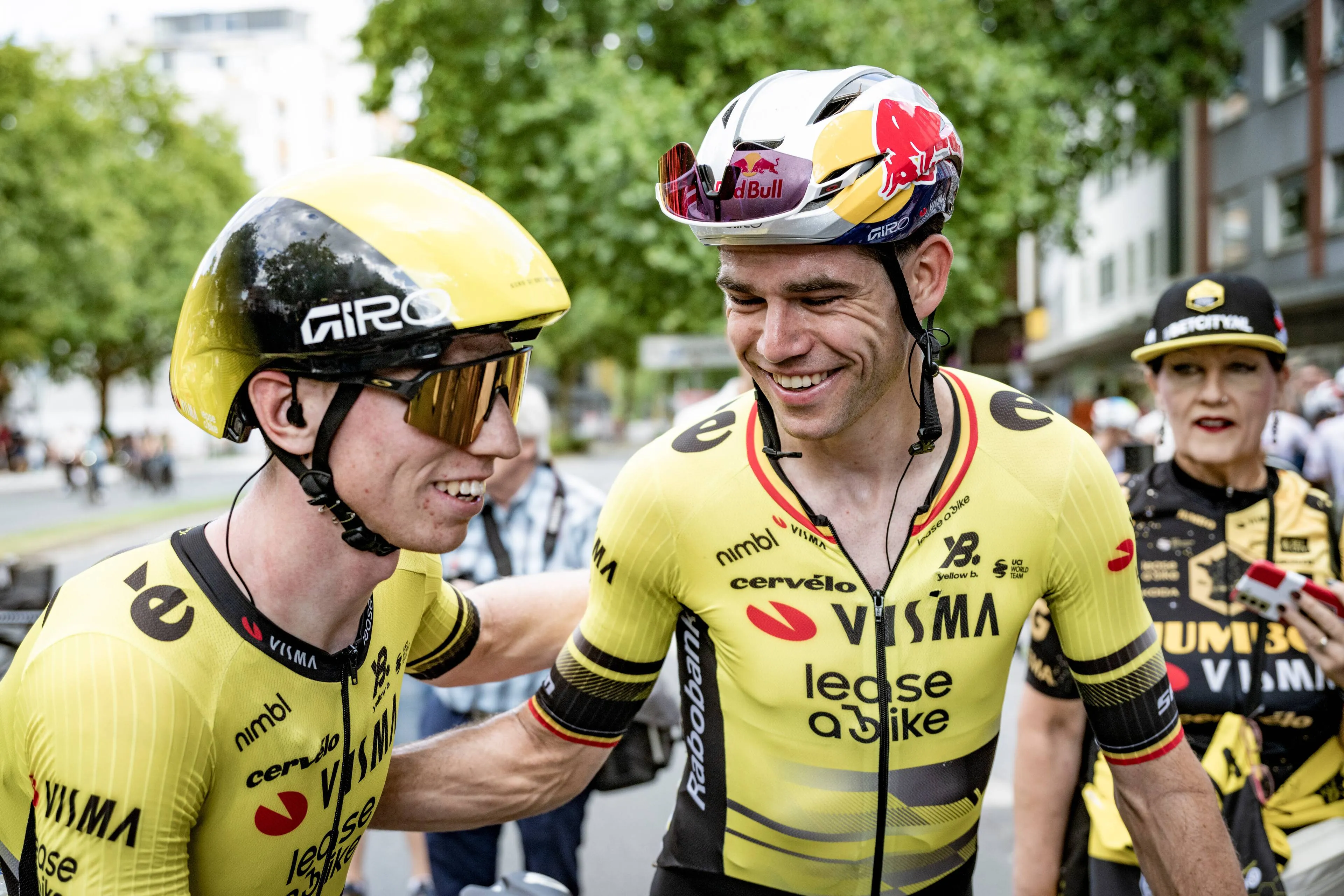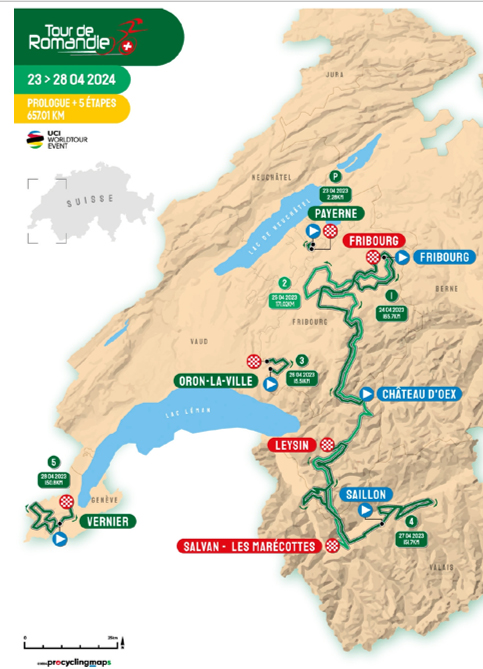PREVIEW | Tour de Romandie 2024 - UAE battle Hindley, Bernal, Lutsenko and Lenny Martínez in exciting and mountainous week of racing
CyclingTuesday, 23 April 2024 at 08:41

The Tour de Romandie is set to unfold from April 23rd to 28th, standing as a cornerstone event in the World Tour calendar. Known for its diverse terrain and challenging stages, it provides ample opportunities for riders to secure victories. This race follows closely after the Ardennes classics, marking the first major stage race of the season. Let's take a look ahead at what this prestigious event has in store.
The race begins with a 2.2-kilometer prologue in the town on Payerne. This is going to be quite an interesting day, where big gaps will not happen, but a first leader will be found at the end of the day.
Read also
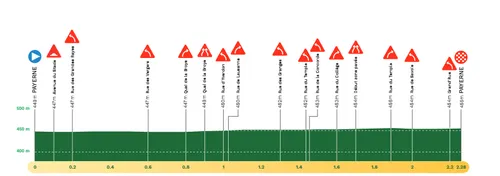
Prologue: Payerne - Payerne, 2.2 kilometers
However this may not be a specialist. This is not a prologue that actually fits the time-trialists, and no-one in specific except for good bike handlers. See this prologue features nothing short of 10 90-degree corners.
This means there is a corner on average every... 220 meters. Funnily enough, most of them are actually situated in the final two thirds of the course. It's an extremely corner-dense prologue where the differences should actually be made according to how fast the riders take the corners. High risks will be taken by some, with a high reward however.
Read also
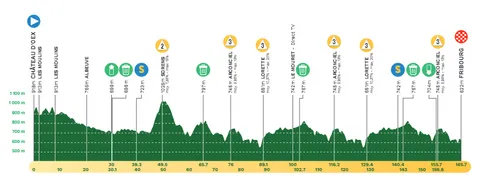
Stage 1: Château-d'Oex - Fribourg, 165.6 kilometers
Stage 1 of the Swiss race will have a finale in Fribourg after 165 kilometers in a day that features quite a lot of rolling roads. Possibly, it's a day for the sprinters, but there could be some surprises. The riders have a two-lap circuit towards the end of the stage with two main climbs where sprinters can be dropped.
One of them is 700 meters at 13% which summits with 36.5 kilometers to go, followed by rolling roads. This particularly is an attractive place to attack, but perhaps too early for the likings of some riders - although if it were a classic, without a doubt there would be action here.
The final climb is 1.8 kilometers at 7.3% into Arconciel, it ends with 10 kilometers to go. It is close enough to the finish that a strong group going up the road can be very hard to bring back. The peloton will not be able to have a full-on chase after these efforts.
The riders descend almost all the way into the final 4 kilometers. These will then be flat into Fribourg, there is still time to bring things back into a sprint.
Read also
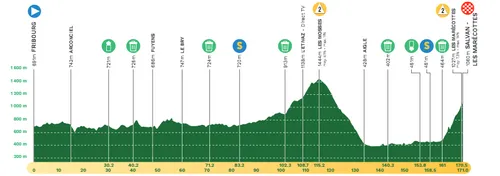
Stage 2: Fribourg - Salvan-Les Marecottes, 171.6 kilometerss
Roads that will be familiar to the Romandie peloton. A lot of the route from Fribourg into Aigle has been raced in the past, but the finale of the stage will be quite hard and should set some important differences in the fight for the overall classification. Stage 2 ends in the climb to Les Marecottes.
The first half of the stage is almost completely flat, and the riders then find the climb to les Mosses which summits with 57 kilometers to go. However the climb is not steep. What follows is a long descent into Aigle where the headquarter of the UCI is.
The riders will not stop, but instead race into the final climb which starts a few dozen kilometers later. The climb to Les Marecottes is 8.4 kilometers at 7.4%. Not overly long, overly steep or overly technical, but all-in-all tough enough to make differences. It's a rather constant ascent but it does feature double-digit gradients in the final kilometer which means that differences can be created right until the finish line.
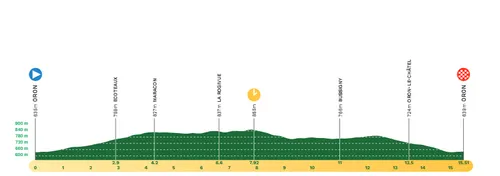
Stage 3 (ITT): Oron - Oron, 15.5 kilometers
A decisive day of racing, the time-trial in Oron is 15 kilometers long and will create big differences. These may be key for the outcome of the overall classification. But it is not an average stage against the clock, featuring some climbing and descending. Time-trial bikes will not be replaced by a road bike, but we will surely see some different tactics on how to manage the efforts that will be in store.
The riders will climb from 635 to 853 meters of altitude in the first 7.5 kilometers into the intermediate point. This means this whole section averages around 4% gradient; whilst it's toughest section is 1.8 kilometers at 6.5%. This climbing will take a few minutes and can absolutely see gaps emerge at the top.
Following that, we've got some descending and then actually flat roads for a few kilometers, but after that around two downhill kilometers into Oron which will be very fast but also technical. They can be dangerous, and with the finish line in sight they have to control the risks.

Stage 4: Saillon - Leysin, 151.3 kilometers
The queen stage perhaps? That argument definitely holds up when we see the amount of climbing on the menu. A small hilltop at the start, but perhaps the most difficult feature of the day is the first categorized ascent ascent to Ovronnaz. It is 9.1 kilometers at 9.5%; a brutal climb where a breakaway may be formed, attacks may come or a team may put on the pressure and break the race into pieces. Everything is possible, but it is still quite early in the day.
The 3500 climbing meters on the day come from a string of ascents that come later on the day. 2.1Km at 8.6% (72.5Km to go), 9.6Km at 5.4% (51Km to go) and 4.1Km at 8.2% (44Km to go). These are unlikely to see attacks, but will continue to create damage in the peloton. A very technical descent follows.
But the attacks are expected in the final ascent to Leysin. A known finale, but a more difficult one than normal. It's 15 kilometers at 5.9%, with some tough gradients close to the finish. The final kilometers are it's toughest; and the final kilometer features some technical and tight streets which should make for spectacular footage.
Read also
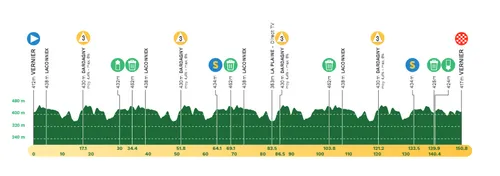
Stage 5: Vernier - Vernier, 150.4 kilometers
The final day of racing this year is a hilly day fully made up of a circuit around the city of Vernier. 1600 meters of climbing in 150 kilometers, not overly hard, the profile definitely oversells it. But the prospects of a breakaway cannot be discounted as the rolling roads will be fatiguing in the peloton, but also not the easiest to chase.
Until 11 kilometers to go the riders are in the circuit, with a few small big-ring hilltops where attacks are possible, but also some sprinters may be dropped.
However, a bunch sprint is quite possible at the end of this race. If so, it will not be an easy one, with a few corners in the final 1.5 kilometers that will stretch things out. The final one with only 350 meters to go, it will definitely see a race to that corner, before the final sprint.
Read also
The Favourites
UAE - Adam Yates won here last year and returns to defend his title. UAE have a truly great collective with very strong domestiques, and four riders who can fight for the GC win. Juan Ayuso to start off has found his consistency this year and has not only won Itzulia Basque Country, but finished second to Vingegaard at Tirreno-Adriatico. He has been time-trialing in an incredible way and will be extra dangerous for that reason. Yates returned from injury in Abruzzo, his climbing level was quite good but he couldn't make the difference actually. With a few more weeks of training that may change however. There he had Pavel Sivakov who is also in good form and provides another card for the team - however one who may be in luxury domestique role. Lastly, Brandon McNulty should enjoy the non-steep ascents the riders will find; together with a lot of time-trial kilometers and a hilly day he can take advantage in the same way that almost saw him win Paris-Nice.
Aleksandr Vlasov & Jai Hindley - Hindley has shown real improvement in the time-trials and we can expect him not to lose much. Adding this to his strong season thus far and really good uphill performances, the Australian and his consistency can go a long way into the race's interesting GC fight. Aleksandr Vlasov has not shown his best form recently, but following his podium result at Paris-Nice (and fourth in Catalunya) he absolutely is a contender for the podium or more here.
Lenny Martínez & David Gaudu - The French team's duo won all three of the Doubs and Jura classics just over a week ago. Neither love the time-trials, but in the mountains both can make the difference. Martínez is already an established top climber and has given me every reason to believe that he will contest for victories once again. Gaudu has been less consistent, but has recently taken his first win in almost two years and must not only be in form but motivated.
Alexey Lutsenko - The Kazakh is flying, which is great news for Astana's point-hungry scoreboard. In real terms, it is very possible to see Lutsenko in the podium or even more. How he handled UAE at the Giro d'Abruzzo was truly impressive and his climbing is the best I've seen in years. Back to his best level, he can race quite well against the clock and can do well on all kinds of climbs and even sprint. As long as he is not in the lead of the race in the mountains, which may be dangerous as the lineup is very modest, he should be in perfect position to strike.
Read also
We've got Egan Bernal coming in, after a very promising and strong podium at the Volta a Catalunya and a good performance at Liège-Bastogne-Liège. Long climbs suit him and rough weather would also not be an issue for him. He's joined by Thymen Arensman who is also a good outsider for the GC and also Carlos Rodríguez. We've got two big wildcards in Enric Mas who returns to racing after Catalunya; and Richard Carapaz who feels more like a classics rider since joining EF and has very rarely showed the same level on the longer climbs. Lidl-Trek duo Tao Geoghegan Hart and Giulio Ciccone have an important test ahead of the Tour de France following their injuries; we can also expect good rides from the likes of Ilan van Wilder and Damiano Caruso.
The overall classification should also be contested by Team Jayco AlUla trio of Simon Yates, Eddie Dunbar and Luke Plapp who are gearing up towards the Giro d'Italia here. The list of other outsiders includes Yannis Voisard, Guillaume Martin, Cristián Rodríguez, Clément Berthet, Koen Bouwman, Louis Meintjes and Harm Vanhoucke.
Read also
Other big riders
In six days of racing the peloton will find two time-trials, a rate of racing against the clock seen nowhere else in the World Tour. Although many are missing, we still have top time-trialists coming in to seize the opportunities such as Magnus Sheffield and Mattia Cattaneo.
In the sprint stages we can expect Ethan Hayter and Alberto Dainese to be among the leading figures; whilst Julian Alaphilippe may star in the hilly days together with Thibau Nys who starts his road season here.
Prediction Tour de Romandie 2024 overall classification:
*** Juan Ayuso, Jai Hindley
** Adam Yates, Lenny Martínez, Alexey Lutsenko
* Pavel Sivakov, Brandon McNulty, Egan Bernal, Tao Geoghegan Hart, Ilan van Wilder, Richard Carapaz, David Gaudu, Enric Mas, Aleksandr Vlasov, Thymen Arensman, Simon Yates, Carlos Rodríguez
** Adam Yates, Lenny Martínez, Alexey Lutsenko
* Pavel Sivakov, Brandon McNulty, Egan Bernal, Tao Geoghegan Hart, Ilan van Wilder, Richard Carapaz, David Gaudu, Enric Mas, Aleksandr Vlasov, Thymen Arensman, Simon Yates, Carlos Rodríguez
Pick: Juan Ayuso
Read also
claps 2visitors 2
Just in
Popular news
Latest comments
- Great champion Remco but his profile is more suitable for Ardennes-like races and tour with no very hard climbs. Not only Tadej and Vingegaard, there are a lot of younger cyclists (del Toro, Ayuso, maybe Seixas, Nordhagen and others) that will soon be big GC boys.
 maria2024202418-02-2026
maria2024202418-02-2026 - Evenopoel 1st real test, and he failedZamorano18-02-2026
- Remco is not the natural climber that riders like Tadej or Jonas are, no matter how much he trains and prepares for it. Yes, you can TT your way up moderately steep hills, but when the gradient gets super steep, he just can't keep up.
 santiagobenites18-02-2026
santiagobenites18-02-2026 - So against the better riders and a long mountain, Remco cracked. Sorry but way away from Pog and Jonasabstractengineer18-02-2026
- “I was portrayed as the devil" Bruyneel was really a talented team manager. His minor flaws: "coordinated, well-funded, and sophisticated doping regime" "hand-in-hand in implementing the team-wide doping programme" "was involved in trafficking and administering prohibited substances and methods, including EPO, blood transfusions, testosterone, human growth hormone, and cortisone. Teammates testified that nothing significant happened without Bruyneel's knowledge and approval." "fostered an environment where doping was considered a "fact of life" and necessary for success, effectively making it a condition of survival on the team. He also participated in or assisted with the cover-up of positive tests and doping violations." Those quotes show Bruyneel's true talent.Cyclingnut18-02-2026
- Fed up hearing "their" voicesslappers6618-02-2026
- When you join Ineos , learning , time , no pressure go out of the windowabstractengineer18-02-2026
- The UCI screws up againcaptmike18-02-2026
- No matter what people say - I'll watch it. And I bet all the complainers will do it too....averagecyclist18-02-2026
- Exactly what I'm thinking about it. Moreover Van Glis had a lot of time to rethink his situation but decided to stay where he was.averagecyclist18-02-2026
Loading
Découvrez la cartes du parcours du #TDR2024, dévoilée ce matin à Vernier (GE). Concentré et nerveux comme un "espresso", ce Tour de Romandie!
4 Comments
